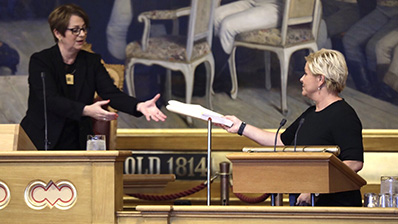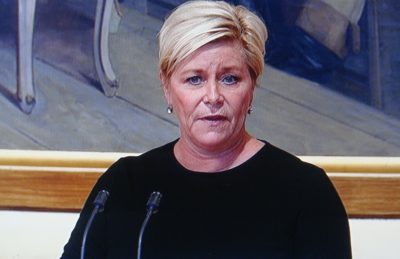Finance Minister Siv Jensen presented the conservative Norwegian government coalition’s state budget proposal on Monday that seems to offer something for everyone. While Jensen stressed that “it’s good for the country,” it was widely viewed as especially good for the small Christian Democrats party that will ultimately decide the fate of both the budget and the government later this autumn.

Jensen herself told reporters, before she strode up to the podium in Parliament, that she thinks the Christian Democrats should “want to join the government when they read the budget.” She quickly added, however, that “it’s a good budget to secure the good economy and the welfare state.”
There’s no question that the government, however, is keen to secure the ongoing support of the traditionally non-socialist Christan Democrats party (Kristelig Folkeparti, KrF), and keep them from switching sides in Parliament and joining the Labour Party-led opposition. The proposed state budget for next year offers, for example, a major increase in foreign aid, one of the Christian Democrats’ major priorities. Jensen and her colleagues are proposing an allocation of NOK 37.8 billion (nearly USD 5 billion), up 7.1 percent from last year and comfortably equal to 1 percent of Norway’s gross national product. That maintains Norway as one of the most generous donor countries in the world.

The government is also nearly tripling the number of UN-certified refugees it’s willing to take in next year, another pet issue for the Christian Democrats. The actual number, though, is only equal to around 3,000, since Jensen’s Progress Party has been keen to first integrate the roughly 30,000 who arrived in 2015 before accepting thousands more. The budget also offers more aid to families with small children, more funding for teachers, more programs to narrow differences between rich and poor and more money for farmers and outlying districts, to name just a few issues. The question is whether it will be enough to fully satisfy the Christian Democrats.
“Never before has a party with such low voter support had so much power over a state budget,” wrote Elisabeth Holvik, chief economist in the nationwide banking chain Sparebank1, in newspaper Aftenposten on Monday. At stake is whether the conservative coalition government led by Prime Minister Erna Solberg and Jensen that was re-elected by voters last year will end up being toppled and replaced by another minority government coalition on the left-center side of Norwegian politics that includes the Christian Democrats.
Political commentators had already been expecting that the budget would be nothing short of a marriage proposal to the Christian Democrats, to finally formalize its five-year cooperative partnership. “They must of course decide whether they think they’ll win more political achievements on the other side,” Henrik Asheim, who leads the Parliament’s finance committee. “I don’t think they will.”
A mostly ‘neutral’ budget
In other key aspects of the budget, Jensen confirmed slightly more use of Norway’s oil revenues but well within the amount allowed (3 percent of the size of the Oil Fund where the vast majority of Norway’s oil money is saved for future generations). The government only used 2.6 percent last year, and is proposing 2.7 percent this year. Kjell Ingolf Ropstad, deputy leader of the Christian Democrats, said his party, at least, was satisfied with how the government intends to keep restricting its use of oil revenues.
The budget also reflects Norway’s strong economy that has recovered from the oil price collapse in 2014. Jensen was clearly proud of how the government managed the economy during that crisis: “We handled it,” she said from the podium, “and came out of it stronger than before.” Her budget is based on expected ongoing economic growth of 2.7 percent during the next year, and that Norway’s unemployment rate will decline to just 3.7 percent, from the already low level of 3.8 percent.
Jensen insists the budget, released at the same time as a new UN report calling for far more emission cuts by 2050, also contains several climate friendly measures “that will lower our emissions.” Funding for rain forest preservation has been increased, there’s more support for renewable energy projects and more punitive measures aimed at influencing personal consumption.
Addressing the opposition
There were also several measures that should satisfy opposition parties like the farmer- and district-friendly Center Party, which criticizes the government at every opportunity. Not only did it get more compensation for farmers after last summer’s drought, the government is also proposing an increase of NOK 535 million to Heimevernet (Norway’s Home Guard), a military unit close to the Center Party’s heart, plus NOK 73 billion in transport projects, another traditional area of concern to the Center Party that wants more and better roads, bridges and tunnels in outlying areas. The government is also offering another NOK 295 million to Norway’s coastal defense (Sjøforsvaret).
With the stronger economy resulting in an increase tax revenues, the government is also proposing modest increases in spending for elder care, psychological services, research and education, integration programs, police and cultural institutions. Even some proposed tax cuts are meant to placate the Christian Democrats, for example through higher deductibles on the fortune tax value of shareholdings. Company tax will be reduced once again, from 23- to 22 percent.
There was also some laughter among all the Members of Parliament assembled on Monday when Jensen described a proposed decline in a highly controversial sugar tax that had been imposed earlier to placate the Christian Democrats. She’s now willing to maintain the tax on sugary soft drinks but not on various forms of chocolate, which involved an unusually detailed interlude on the differences among chocolate-covered marsipan products that are especially popular at Christmastime.
Debate delay and uncertainty loom
Jensen claimed the state budget she presented on Monday will ensure “a strong and more secure Norway.” Opposition parties will need to hunt for things to complain about and they surely will. Labour Party leader Jonas Gahr Støre was already claiming that “this is a state budget that will increase differences among folks,” complaining that the government was cutting taxes on individual net worth again while not offering enough funding for children in poor households.
Full debate over the budget, however, will have to wait until the Christian Democrats decide in early November which side they’ll take. Ropstad, who wants his divided party to join the government instead of toppling it, was nonetheless reserved, claiming the budget itself would not decide the issue. He seemed to realize that his party is effectively holding up the budget process.
Jensen has said, meanwhile, that she has “respect for KrF’s process,” and she repeated that before dawn on Monday at the start of a very long day that would continue into the evening. She admitted the government and the rest of Parliament will have to live with no small degree of political uncertainty for another month. “They (the Christian Democrats) have to make up their own minds, but we have cooperated for five years!” she exclaimed on NRK’s early morning radio talk show Politisk kvarter before heading for Parliament.
She and the rest of the government led by Prime Minister Erna Solberg want to keep on cooperating, not least so that Monday’s state budget presentation won’t be Jensen’s last. She seemed to make a direct appeal to the Christian Democrats as she wound up her budget presentation: “I hope I can stand here again next year and say that everything went well, again.”
newsinenglish.no/Nina Berglund

